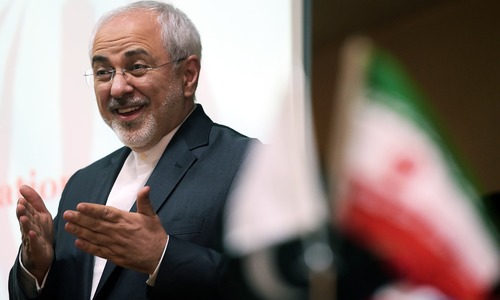
ISLAMABAD: Iranian Foreign Minister Dr Javad Zarif on Monday invited Pakistan to participate in Chahbahar seaport project and development of its link with Gwadar Port as he sought to allay concerns here over Indian involvement in the Iranian port.
“We offered to participate in the China-Pakistan Economic Corridor (CPEC). We have also offered Pakistan and China to participate in Chahbahar,” Dr Zarif, who is on a three-day visit to Pakistan, said while delivering a lecture at the Institute of Strategic Studies Islamabad (ISSI) that had been held to commemorate 70th anniversary of establishment of Pak-Iran diplomatic relations.
Dr Zarif had earlier held bilateral talks with his Pakistani counterpart Khawaja Asif at the Foreign Office and addressed a trade conference. The visiting foreign minister is being accompanied by a large trade delegation from Iran.
Pakistan had always been concerned about Indian involvement in Chahbahar port. These concerns got amplified after Iran last month signed a lease agreement with India, which would give operational control of the port to the latter.
Foreign Minister Zarif says Tehran’s relations with New Delhi are not against Islamabad
Emphasising that both Gwadar and Chahbahar were important projects for development of deprived Eastern and South-eastern Iran and South Western Pakistan, he said that both needed to be linked through sea and land routes for effecting their complementarities.
“We are taking measures to do that and there is an open invitation to Pakistan to participate in that,” the foreign minister said.
Mr Zarif further clarified that Chahbahar port project was not meant to “encircle Pakistan … strangulate anybody”. He twice said Iran would not allow anybody to hurt Pakistan from its territory much like Pakistan would not allow its soil to be used against Iran.
He likened Iran’s relations with India to Pakistan’s ties with Saudi Arabia. “Our relations with India, just like Pakistan’s relations with Saudi Arabia, are not against Pakistan as we understand Pakistan’s relations with Saudi Arabia are not against Iran,” the crafty and skilful diplomat said trying to remind about his country’s concerns.
Dr Zarif also laid out his vision for better ties between Pakistan and Iran, which envisaged realisation of long delayed Iran-Pakistan gas pipeline, establishment of banking ties, signing a Free Trade Agreement (FTA) and making Gawadar and Chahbahar ports complementary.
Banking relations are considered crucial to expanding bilateral trade, which is currently at $1.2 billion. The target is to increase it to $5bn per annum over next few years, but it looks to be a difficult goal to achieve in the absence of regular banking channels.
In April last year, the State Bank of Pakistan had signed a Banking and Payment Arrangement (BPA) with Iran’s central bank, Bank Markazi Jomhouri Islami Iran (BMJII) for providing a trade settlement mechanism to promote bilateral trade. The central banks of the two countries were to subsequently invite commercial banks to carry out transactions under the BPA. But, no progress could be made due to lack of interest of Pakistani banks.
Similarly, there is a consensus that IP gas project is beneficial for Pakistan’s economy, but still it is frozen on the Pakistani end due to external and internal factors.
BILATERAL TALKS: During the bilateral talks, a FO statement said: “The two sides agreed to continue engagement for enhancing economic cooperation, including bilateral trade, investments and commercial interaction to promote shared prosperity … addressing tariff and non-tariff barriers” in addition to concluding FTA on priority.
“The Foreign Ministers underlined that as two brotherly neighbouring countries Iran and Pakistan would deepen connectivity between the two sister ports of Gawadar and Chahbahar to benefit from their complementarities,” the statement added.
The two sides decided to expedite operationalisation of two new border crossings that was agreed long time ago.
APP adds: Prime Minister Shahid Khaqan Abbasi said that Pakistan and Iran should work together and make their utmost efforts for enhancing the bilateral trade to $5bn by 2021.
In a meeting with Foreign Minister Dr Javad Zarif, who called on him here, the prime minister reaffirmed Pakistan’s desire to enhance mutually beneficial economic cooperation with Iran including bilateral trade, investments and commercial interaction.
During the meeting, both sides discussed efforts for strengthening of bilateral relations and issues related to peace and security in the region.
Prime Minister Abbasi emphasised the need to deepen connectivity to harness benefits from regional economic integration.
He expressed his commitment to work to resolve the issues in implementation of Iran-Pakistan gas pipeline project, including the financing of pipeline infrastructure and the scope of snap back clause.
The prime minister said that Pakistan was working towards realising its vision of a peaceful and inter-connected region for shared progress and prosperity.
“We believe that a peaceful and stable Afghanistan is vital for economic progress of the region and Pakistan and Iran as the two neighbouring countries can make important contribution for achieving this objective,” he remarked.
He thanked the Iranian leadership for their steadfast support to the principled struggle of Kashmiris.
The Iranian foreign minister appreciated the increasing high-level interaction between the two countries.
He said the mutual efforts of the two countries had resulted in enhanced economic and people-to-people interaction, which should be further strengthened.
Dr Zarif also appreciated Pakistan’s efforts for strengthening border management to prevent illegal cross-border activities.
Published in Dawn, March 13th, 2018













































